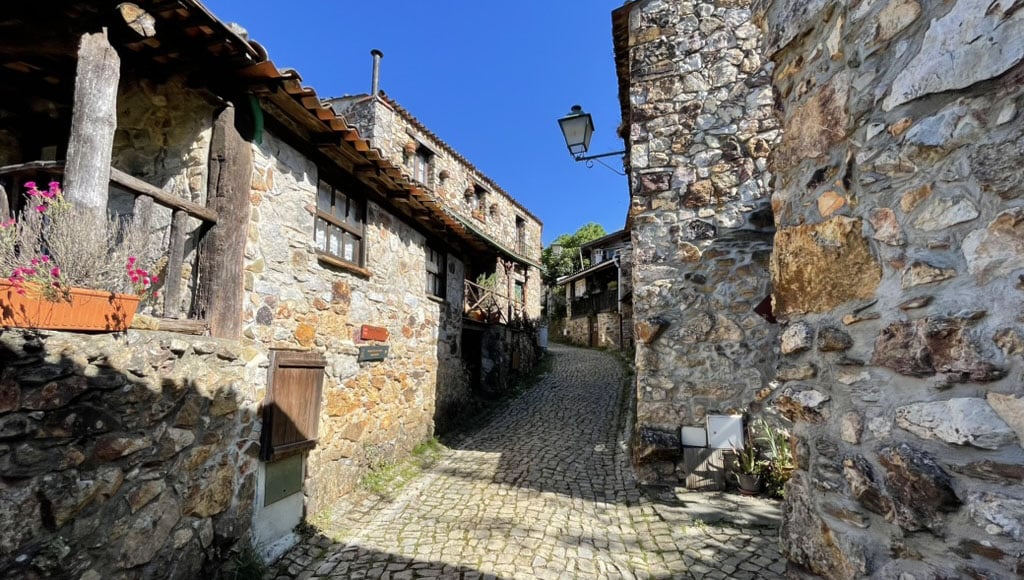What lies behind the increasing coverage of the idyllic lifestyle, reasonably priced properties and low cost of living in Portugal’s inland areas?
Firstly, let’s be honest – for many considering a move to Portugal’s interior, it’s the low cost of property that is far and away the main factor.
Portugal’s interior is attracting young families, nomads, remote workers, retirees and investors alongside business-savvy entrepreneurs who are spotting market gaps in rural areas as tourism develops and the relatively well-funded foreign population increases.
A quick look on idealista.pt illustrates that a €300,000 budget in the Algarve can buy a one or two-bedroom apartment of between 75m2 and 150m2.
In central Lisbon, this budget will buy a 40-60m2, one-bedroom apartment.

The same budget in Portugal’s west central region will secure a 400m2, fully renovated farmhouse; a three-bedroom, 200m2, early 1800s townhouse or a modern three-bedroom country house on 3,500m2 of land, each within five kilometres of a reasonably-sized town.
So, yes, inland property is way cheaper, but what about the social life?
The extent to which you integrate depends entirely on whether you want to or not. There is no exam.
Many incomers follow social media advice and get fully involved in Portuguese language classes, local groups, sporting activities and follow pointers on how to live life without annoying the neighbours.
Against a backdrop of global and financial insecurity, political upheaval and increasing stress levels, many choose a quiet, yet connected life, preferring their own company, going about their business and leisure activities in their own time and in their own way.

Both lifestyles are totally accepted in inland areas, you don’t need to dress to impress or drive a fancy car, but if you do, no one will care and no one will be impressed.
Those drawn to rural Portugal’s varied landscapes of forests, towns and villages should pay close attention to due diligence before snapping up that lovely-looking, stone-built farmhouse or renovation project.
Documentation and boundary definitions for many older properties may have only a passing relationship with reality.
Buyers need to take independent advice and can add value simply by following the process to have properties correctly registered. Buying from a trusted developer will ensure that documents already have been updated.

In rural Portugal, there is a general willingness at local councils and tax offices to help update documentation, thankfully viewing such processes as a positive.
As for weather, the old rule of thumb that the further north you go, the rainier it gets, is being disrupted by an inexorable shift in global weather patterns.
Rainfall in Portugal, once seen as a negative, now brings a welcome level of water security to central Portugal’s reservoirs and rivers.
As for colder winters outside the Algarve, yes, an insulated and centrally heated house is a must anywhere during Portugal’s winter months, certainly anywhere north of the Serra de Monchique.

There is a steady increase in comfortable, heated houses coming to the market in Portugal’s inland areas, mostly in properties that have been painstakingly renovated by owner-occupiers, or by renovation specialists who understand the value of providing bio-climatic properties to a growing market of discerning buyers.
When choosing the country life, location remains key and I see many people making decisions based solely on price while ignoring connectivity.
For more remote village and countryside living, driving a car is a necessity as public transport options may not exist. The benefit of buying a renovated, heated home will soon become a frustration if you don’t have a vehicle in which to get around and about.
Living in a town is a sound choice for many incomers as local life carries on around you, while you decide what to engage in.

The baffling timetable of saint’s days, local holidays, religious festivals, memorial days, random dancing competitions and accordian music, church-related events and farmers’ markets can be navigated with total dedication or with complete indifference; again, nobody cares, but it’s quietly appreciated if you attend the occassional event.
The question of ‘learning Portuguese’ often comes up. The answer is the same as offered to expatriates across the globe – it’s preferrable at least to learn the basics. There certainly is a raft of online learning options and many inland parishes run free or subsidised Portuguese language lessons.

‘Avoiding tourists’ is a driving force for many residents and nationals who move inland from high-density areas to calmer inland ones. This is understandable as businesses operating in the country’s holiday zones are highly effective, with the resulting summertime influx of tourists making day-to-day life increasingly a challenge for residents who face over-stretched facilities and clogged roads.
In summary, if you want lower-cost living in outstanding countryside while choosing your own level of integration, Portugal’s inland areas offers an expat lifestyle that you can create on your own terms.
By Paul Rees
The author runs Rural Properties, an innovative business that invests in the Central Region, buying, renovating and selling properties. For investment enquiries: www.rural-properties.com or contact info@rural-properties.com















